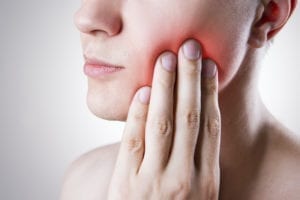TMJ Therapy in Rockville, MD
TMJ is a chronic pain condition that can compromise the function of the temporomandibular joint. For many patients, TMJ-related pain and symptoms are caused by a temporomandibular disorder (TMD) and/or teeth grinding. TMJ is commonly misdiagnosed and, when left untreated, can cause damage to the teeth, gums, and jaw. TMJ disorders can interfere with a patient’s quality of life by making it difficult to eat or speak comfortably and be the underlying cause of chronic facial pain.
The Causes of TMJ Disorders
TMJ disorders develop for many reasons and are often the result of several issues with your jaw and bite. You might clench or grind your teeth, tighten your jaw muscles, and stress your TM Joint. Or, you may have a damaged jaw joint due to injury or disease. Crooked teeth can also cause stress on the jaw and result in TMJ. Whatever the cause, the results may include very painful symptoms often associated with TMJ.
Signs & Symptoms of TMJ

Knowing the signs and symptoms of TMJ can help patients prevent further oral health complications such as worn teeth or damage to the function of the bite. If you notice any changes in your oral health, be sure to let Dr. Sarkarzadeh know.
- Frequent headaches
- Difficulty or pain when chewing or swallowing
- Earaches or ringing ears
- Face, neck, shoulder, and back pain
- Jaw clicking, popping, or locking
- Jaw pain and tension
- Numbness or tingling in the hands or fingers
During an examination with Rockville, MD dentist Dr. Ali Sarkarzadeh, he will look for signs of TMJ, such as worn or damaged teeth. If you are experiencing any of the above signs or symptoms, you should inform him during your appointment as well. Dr. Sarkarzadeh offers comprehensive and personalized treatment plans to help patients resolve symptoms, prevent damage to their teeth and gums, and address other oral health concerns associated with teeth grinding and TMJ-related disorders.
TMJ is a progressive oral health concern that we can best treat if caught early. Left untreated, TMJ can cause complex bite disorders and damage to the jaw, teeth, and gums. Dr. Sarkarzadeh treats each patient on an individual basis and offers treatment options to prevent further deterioration of the patient’s oral health. Treatment will vary and depend on the patient’s oral health, alignment issues, lifestyle, and budget.
Treatment Options for TMJ Disorders
- Oral Sleep Appliance: We custom-design and fit an oral sleep appliance to prevent teeth grinding. The custom sleep device realigns the jaw into a more comfortable resting position that will not put stress on the TMJ muscle. An oral sleep appliance can also prevent further damage to the teeth and gums caused by bruxism.
- Restorative Dentistry: We can address tooth damage and bite imbalances with a range of restorative dental treatments.
- Orthodontics: If malocclusion is affecting the comfort and function of your bite, Dr. Sarkarzadeh may recommend orthodontic treatment.
- Change in lifestyle habits: Exercise, yoga, and other therapeutic activities can help patients release stress and tension to prevent jaw clenching or grinding. Dr. Sarkarzadeh may make other recommendations for changes that may help alleviate TMJ pain.
TMJ Treatment FAQs
Can I treat TMJ at home?
Sometimes a TMJ issue can be treated at home if it has been determined that it is a minor issue by your dentist. You can practice jaw exercises and other at-home remedies for your jaw pain. Although, you will need professional treatment if it is a more moderate to very severe TMJ issue.
How long does it take for TMJ to go away?
The length of treatment and results will depend on the severity of your TMJ problem and how well you follow your treatment plan. The chosen treatment option also has an effect on the time it will take for your TMJ issues to be resolved. TMJ disorder does not go away on its own.
What happens if I don’t treat TMJ?
As mentioned above, a very mild case of TMJ has the potential to dissipate on its own. If you let moderate to severe TMJ issues go untreated, it is very likely that your issues can become chronic and debilitating. Your dentist can determine the severity of your issue with a thorough dental exam.
How do you diagnose TMJ disorder?
Dr. Sarkarzadeh diagnoses TMJ disorder by doing a complete mouth assessment. You will need to relay all the TMJ symptoms, including jaw pain or clicking. He will also examine your jaw joint and the surrounding muscles. We will take X-rays or other imaging tests to get a better look at the joint’s structure and function. These tests will help Dr. Sarkarzadeh determine if you have TMJ disorder and suggest the best treatment.
Can stress worsen my TMJ pain?
Yes, stress can make your TMJ symptoms worse. When you are under a great deal of stress, you may unconsciously clench your jaw or grind your teeth. This type of pressure puts additional strain on the joint. Managing stress through relaxation techniques and seeking treatment can help alleviate TMJ symptoms.
What is a TMJ mouthguard?
A TMJ mouthguard, or splint, is a custom oral device that will protect your teeth and jaw joints. You will wear it at night to prevent teeth grinding and clenching, which can make TMJ symptoms worse. The mouthguard helps relax the jaw muscles, reducing pain and promoting better jaw alignment.
What food should I avoid if I have TMJ problems?
We will suggest avoiding hard, chewy, or sticky foods if you have TMJ problems. These types of foods require a lot of jaw movement and pressure. Stay away from stuff like hard candy, tough meat, and all foods that are hard to bite into. Softer foods like soups, mashed potatoes, and pasta are less likely to strain your jaw.
